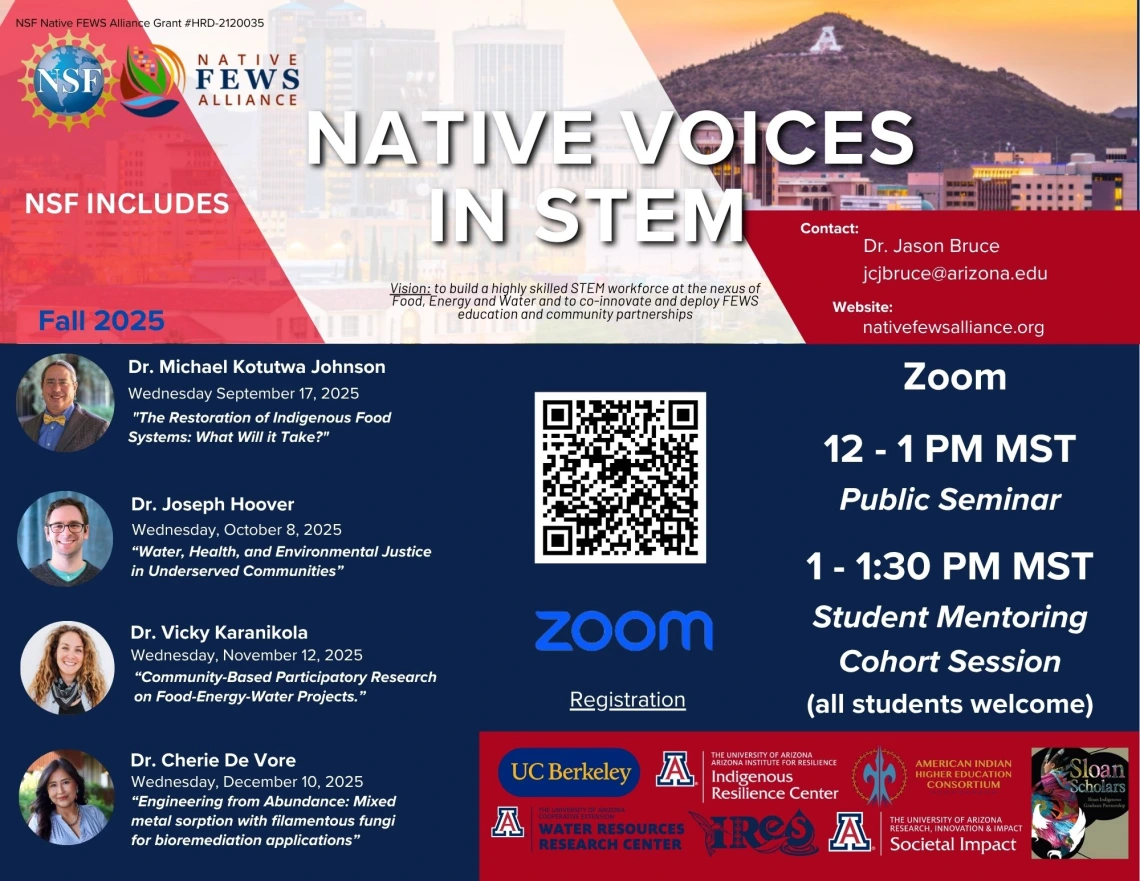Native Voices in STEM: Advancing Research Rooted in Community and Resilience

This fall, the Native Voices in STEM seminar series continues to highlight scholars whose work strengthens the connection between research, community, and Indigenous resilience. Hosted by the Indigenous Resilience Center (IRes) in partnership with the Arizona Institute for Resilience, the Water Resources Research Center, the American Indian Higher Education Consortium, and Societal Impact at the University of Arizona and UC Berkeley, the series welcomes speakers whose research bridges disciplines and uplifts relationships between people and the environments they call home
The series began on September 17 with a presentation by Dr. Michael Kotutwa Johnson, Assistant Professor in the School of Natural Resources and the Environment and core faculty member of IRes. His talk, “The Restoration of Indigenous Food Systems: What Will It Take?” drew from his ongoing work to restore Indigenous agricultural systems through education, practice, and policy. Dr. Johnson spoke about the deep interconnections between food, culture, and self-determination, reminding participants that restoring food systems is not just about production, but about restoring ways of life. His reflections on Hopi dry farming and community stewardship offered a grounded perspective on how cultural continuity and environmental care remain central to Indigenous resilience.
On October 8, the series continued with Dr. Joseph Hoover, an environmental scientist and geographer, whose presentation, “Water, Health, and Environmental Justice in Underserved Communities,” explored how geography, water resources, and public health intersect in rural and Tribal regions. Dr. Hoover’s interdisciplinary research investigates patterns of environmental exposure and contamination, particularly through drinking water, and their implications for community health. He emphasized the importance of clear communication of environmental and water quality information, helping communities visualize and understand risks while shaping informed local solutions. His presentation highlighted that addressing inequities in water access and quality requires both rigorous data and partnerships rooted in trust.
The next Native Voices in STEM presentation will feature Dr. Vicky Karanikola, Associate Professor of Chemical and Environmental Engineering, on Wednesday, November 12, 2025, from 12:00 to 1:00 p.m. MST. Her talk, “Community-Based Participatory Research on Food-Energy-Water Projects,” will explore collaborative approaches to sustainable water and energy systems. Dr. Karanikola’s research integrates advanced engineering design with community engagement, focusing on off-grid and small-scale water treatment technologies that meet the needs of resource-limited areas. Her work has contributed to projects with Tribal Nations and marginalized communities, ensuring that engineering innovations are developed in partnership with the people who use and maintain them. Register to attend here.
The Native Voices in STEM series continues to provide a platform for dialogue, reflection, and shared learning across disciplines. Each presentation reveals how science and technology can serve as tools for strengthening community and honoring place when guided by respect, collaboration, and lived experience.
